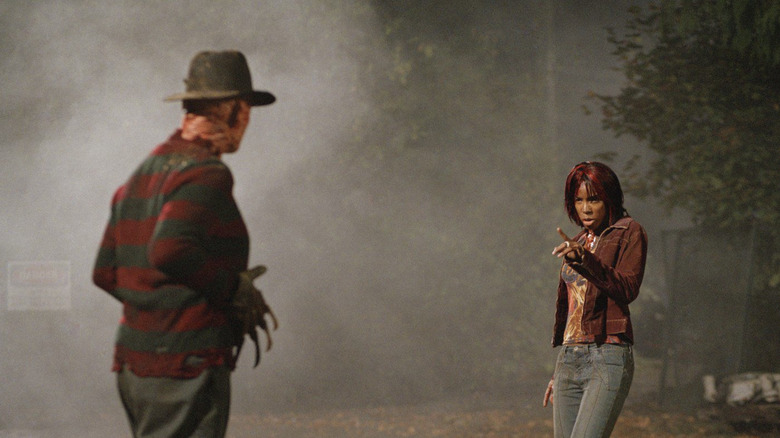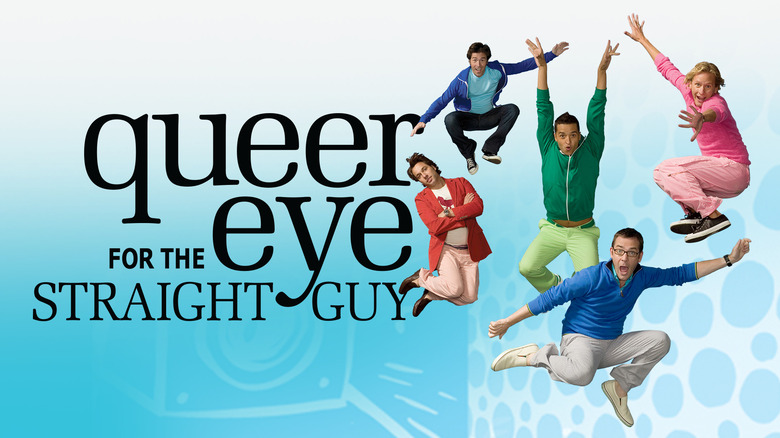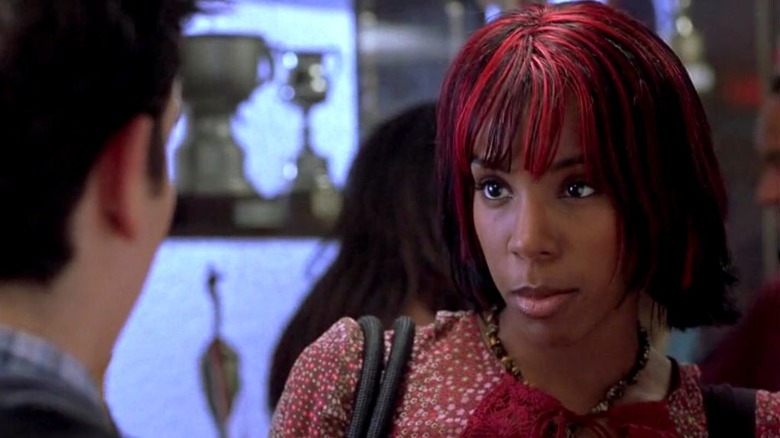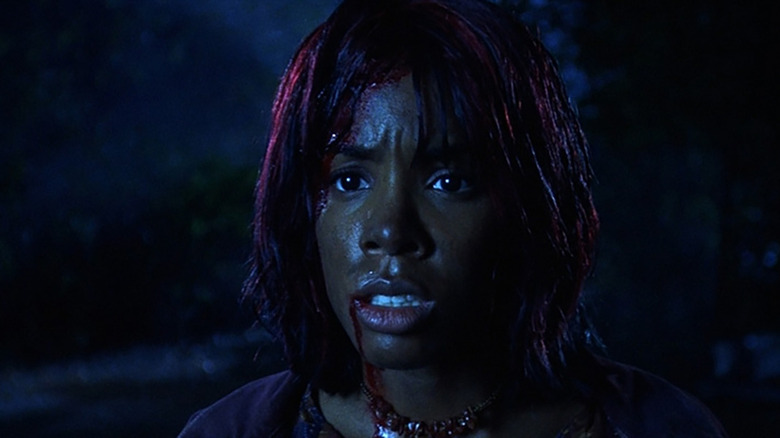Why Kelly Rowland's Controversial Freddy Vs Jason Line Is Still Debated 20 Years Later
Slasher films are known for their one-liners, both the badass and the embarrassing. Dr. Loomis in the "Halloween" series, Freddy Krueger in the "A Nightmare on Elm Street" series, Ghostface in the numerous "Scream" flicks, Pinhead in the "Hellraiser" films, and just about everything Chucky has ever said throughout his franchise have all birthed quotes as memorable as the characters who say them. In the delightfully silly "Freddy vs Jason," one of the most infamous lines is not spoken by either slasher icon or even the film's final girl, but by the secondary character Kia, played by Kelly Rowland of Destiny's Child.
When Kia comes face to face with Freddy Krueger, she doesn't cower in fear — she mocks him. Freddy Krueger thrives on fear, and by choosing to humiliate him instead, she defangs him quite a bit. She spends much of the movie being mouthy to everyone anyway, so it also feels in line with the character. She accuses his long razor fingers as him compensating for being a little short in the trunks, and he refers to her as "dark meat." It's racist as hell, but it's in line with the kind of messed-up stuff Freddy Krueger would say to a would-be victim. And then, out of left field, Kia utters the line heard 'round the horror world:
"What kind of f*ggot" – she pauses for emphasis – "runs around in a Christmas sweater?"
The line has been hotly debated for the last two decades, with some folks (including the film's writers) finding it wildly inappropriate, others viewing it as an utterly hilarious dig, and some falling somewhere in the middle. But one of the bigger mysteries is how the hell the line ended up in the final film, as it wasn't in the original script.
Rewind time to 2003
Language and social norms evolve over time, and it's often hard to remember what the past was really, truly like. I was 13 in 2003, and very much remember how rampant homophobia was at the time because it was the same year I was narrowing in on how I identify myself. The f-slur was tossed around with such casualness that it wasn't a punishable offense in school. A kid could call someone a juvenile insult like "doody-head" one day and a "f*ggot" the next and see the same reprimand. The first season of "Queer Eye for the Straight Guy" debuted the same year, which ushered in a new form of bigotry by judging straight men who had the audacity to wash their asses and clean their fingernails by labeling them as "metrosexuals."
Two years later, the film "The 40-Year-Old Virgin" would have an entire scene debating "Wanna know how I know you're gay?" and it wouldn't be until 2008 that Hilary Duff would end homophobia with her "Don't Say Gay" PSA. (For legal purposes, that last line is sarcasm.) This is all to say that someone dropping the f-slur in 2003 wasn't unheard of, but it did feel alien in a film like "Freddy vs Jason." This is a slasher face-off rooted in fantastical horror with time travel and dream worlds. As scary as they can be, the situations are fake. Meanwhile, homophobia, racism, and bigotry in general are very real things with very real consequences. This is a time period where murderers could still claim "gay panic" to get away with their crimes, and considering Freddy Krueger is canonically a child abuser, equating someone like him with a gay slur has potentially dangerous connotations.
How did Kelly Rowland get put in this spot?
In the legacy slasher resurgence of the late '90s and early aughts, there was an explosion of casting rappers and hip-hop/R&B stars as supporting players. Snoop Dogg, Ice Cube, Ice-T, LL Cool J, Mos Def, Brandy, Rah Digga, Redman, and of course, Busta "Trick or Treat, Motherf*cka" Rhymes all appeared in horror movies during this time period, and this is by no means an exhaustive list. Kelly Rowland was, at the time, breaking out into more solo work as Destiny's Child was starting to wind down. Her duet with Nelly, "Dilemma" was still showing up on the Billboard Hot 100 at the time of release, and she had performed in guest spots on "Taina" and "The Hughleys," which would continue following "Freddy vs Jason" with "American Dreams" and "Eve."
This is to say that the casting of Kelly Rowland also made sense for the time, but because she was the most famous person in the film, this only made that line delivery even more shocking. This is Beyoncé's best friend we're talking about here. Kelly "I Made The World Want Red Highlights" Rowland, the same woman who "texted" Nelly in the "Dilemma" video by typing into Microsoft Excel. Hearing that word come out of her mouth was jarring, to say the least, and immediately sparked debate. But screenwriters Damian Shannon and Mark Swift confirmed to Bloody-Disgusting that it wasn't in the script. "All we can tell you is ... we didn't write it, and we were really shocked when we heard it in the movie," they said. "We complained about it after the first screening, but it was never changed. It's a real stain on the movie, in our opinion." Freddy isn't even the one who kills Kia in the film, Jason does after he machetes her so hard she flies into a tree.
Does this make Jason Voorhees a queer ally?
Letting the mystery stay a mystery
Shannon and Swift's decision not to confirm the origin of the line seems to be two-fold. On one hand, if Kelly Rowland did improvise the line, putting the blame on her would be throwing a Black woman under the bus for a line that would ultimately have to have had approval from the editor, director, and producers to stay in the final product. Putting it all on her would have allowed the rest of those involved to use her as a scapegoat, which reeks of anti-Blackness.
On the other hand, the line could have very well been at the suggestion of a producer or someone in a higher-up role, and calling them out publicly could have irreversible effects on the writers' careers because we know how petty studio execs can be with writers seeking just treatment. There's no definitive answer as to how this line got into the film, and regardless of whose idea it was, there is no singular person to blame for its inclusion.
I can only speak for myself, but I have happily worn a Freddy Krueger sweater to many Ugly Christmas Sweater parties over the years, a way to "don my gay apparel," if you will. And without fail, whenever I enter the room, there has consistently been at least one fellow gay person who immediately realizes why I'm wearing the sweater for a Christmas party — a sign that this line has become "iconic" in queer circles. As is the case with any word used to harm a marginalized group, there's no universally accepted way to handle or feel about a slur being used in a mainstream movie, which means there's no right/wrong way to feel about it.
And it is for this reason that slasher fans, especially queer ones, will never stop debating this line.



